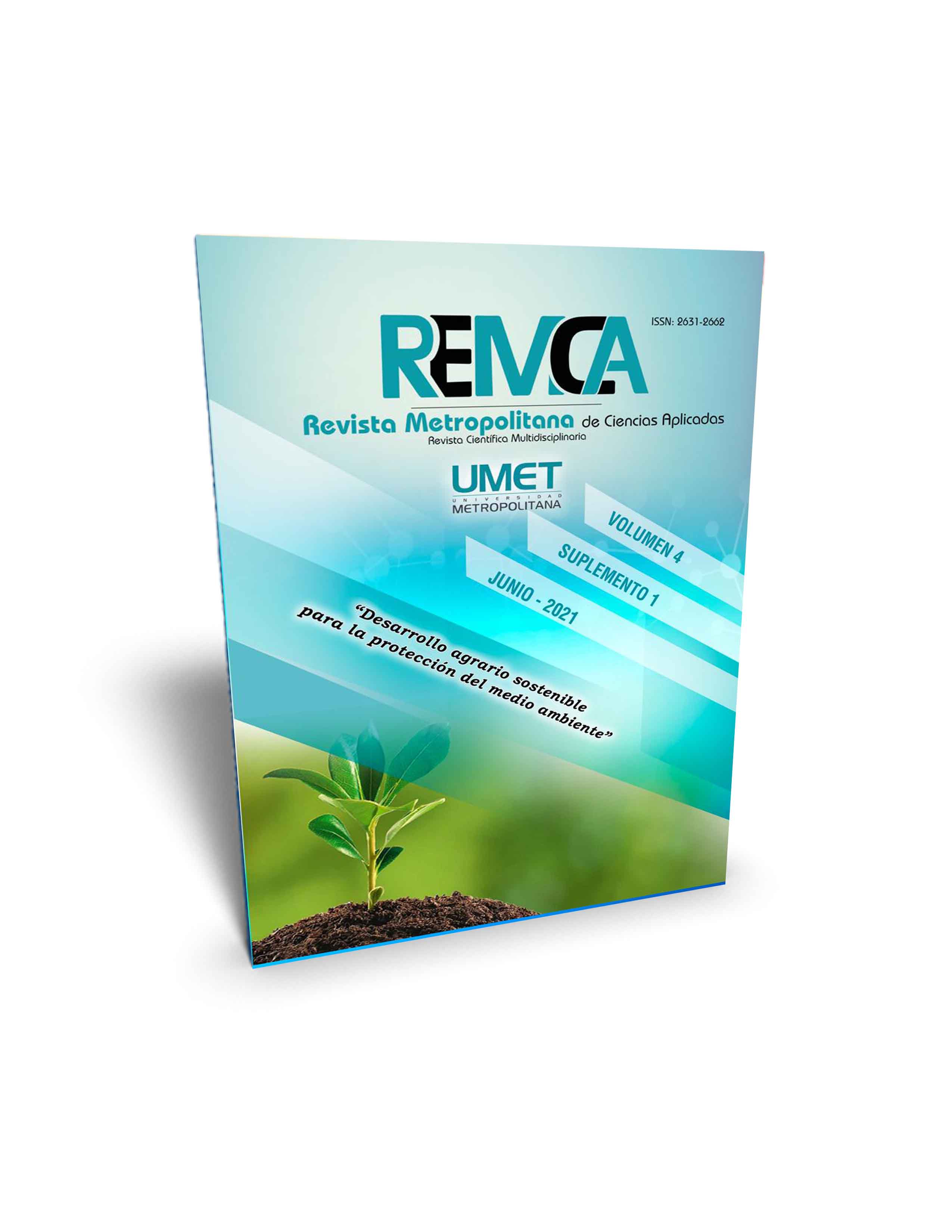Changes in soil properties in the sugarcane entity, and their impact on agroindustrial indicators
DOI:
https://doi.org/10.62452/kwzdc743Keywords:
Agro-industrial efficiency, State indicators, sugar station, Sustainable Land Management, soil properties, agro-industrial processAbstract
The research took place in the sugarcane production entity "El Limpio", in Cienfuegos, Cuba, with the objective of identifying changes in soil properties, and the State Indicators that affect the agribusiness efficiency in the sugar extraction process. For the analysis and organization of the research, the Manual of Procedures for the implementation of Sustainable Land Management was used and other theoretical and empirical methods were also applied, with their corresponding techniques. The data were recorded in worksheets and matrices. The parameters and qualifications were evaluated according to the aforementioned Manual, applying statistical and mathematical methods. The results are: characterization of the sugarcane entity based on Sustainable Land Management; identification of specific indicators to evaluate their status in the implementation of Sustainable Management and identify changes in soil properties that most affect agro-industrial efficiency. As the main conclusion: that the entity has conditions that compromise both the efficiency of its processes and those of the sugar industry to which it is taxed, which could find answers in the systematic implementation of the Sustainable Land Management Plan that is drawn up to this entity.
Downloads
References
Bouza, A. L. (2008). Estrategias Agroecológicas para el Manejo Sostenible de Suelos en la Empresa Azucarera 30 de noviembre. (Tesis de maestría). Universidad de Pinar del Río “Hermanos Saiz Montes de Oca”.
Chile, A., Acuña, I.R., Morejón, M., & Velázquez, N. (2017). Metodología para la construcción de una estrategia de reorganización de la producción en agroecosistemas cañeros. (Ponencia). Congreso Internacional de Marketing, Desarrollo local y turismo. II Simposio Internacional de Desarrollo Agrario municipal. Pinar del Río, Cuba.
Delgado Mora, I., Bernal Villegas, A., Gómez Pérez, J. R., Díaz Mujica, F. R., Aday Díaz, O., González Gallardo, H., Buedo Domínguez, M., Machado Toledo, L. F., Súarez, H. J., García Pérez, H., & Bernal Liranza, N. (2012). Potencialidades de familias de variedades de caña de azúcar para diferentes períodos de zafras en Cuba. Cultivos Tropicales, 33(3), 5-14.
Delgado, I., Pérez, J. L., García, H. J., Díaz, F. R., Bernal, A., González, H., Gómez, J. R., Aday, O., Montes de Oca, J. L., Reyes, S., Gallardo, A., Barroso, J., Machado, L. F., & Nuñez, D. (2013). Evaluación agroproductiva de variedades de caña de azúcar, resistentes a condiciones adversas por déficit hídrico y suestabilidad en varios ambientes. Revista Centro Agrícola, 40(2), 5-10.
Eiza, M. (2020). La degradación de los suelos y sus consecuencias. https://www.infocampo.com.ar/la-degradacion-de-los-suelos-y-sus-consecuencias/
Friedrich, T., & Kassam,A. (2013). Intensificación Sostenible, Medio Ambiente y Desarrollo. La actualización del modelo agrícola para responder a las prioridades nacionales de Cuba. (Ponencia). IX Convención Internacional sobre Medio Ambiente y Desarrollo. La Habana, Cuba.
Galicia, L., & Rodríguez, L. (2016). Causas locales de la transformación del paisaje en una región montaña del centro de México. Revista Acta universitaria, 26(6), 83-94.
Gómez, C., & Gómez, A. (2013). Los límites naturales de la sostenibilidad. Una mirada a las condiciones específicas de Cuba desde los conceptos generalmente aceptados. (Ponencia). I Simposio sobre ciencias de la Sostenibilidad. IX Convención sobre medio ambiente y desarrollo. La Habana, Cuba.
Gravina, B. A., & Leyva, A. (2012) Utilización de nuevos índices para evaluar la sostenibilidad de un agroecosistema en la República Bolivariana de Venezuela. Revista Cultivos Tropicales 33(3), 15-22.
Hernández, A., Pérez, J. M., Bosch, D., & Castro, N. (2019). La clasificación de suelos de Cuba: énfasis en la versión de 2015. Revista Cultivos Tropicales, 40(1), 15-22.
López, R. A. (2002). Degradación del suelo, causas, procesos, evaluación e investigación. CIDIAT-ULA.
Mota, Y. Y., Héctor, E. F., Balmaseda, C. E., Ojeda, R., & Vargas, H. (2015). Alternativas agroecológicas para el manejo sostenible del agroecosistema cañero de Los Cedros, Sucre, Venezuela. Revista de Gestión del Conocimiento y el Desarrollo Local, 2(1), 67-72.
Pozo-Galves, C., Cabrera-Alonso, J. R., Márquez-Reina, E., Hernández-Hernández, O., Ruiz-Sánchez, M., & Domínguez-Palacio, D.(2017).Características y clasificación de suelos Gley Nodular Ferruginoso bajo cultivo intensivo de arroz en los palacios. Revista Cultivos Tropicales, 38(4), 58-64.
Urquiza, M. N., et al. (2011). Manual de Procedimientos para Manejo Sostenible de Tierra. Programa de Asociación de País “Apoyo al Programa de Lucha contra la Desertificación y la Sequía”. Instituto de Geografía Tropical.
Downloads
Published
Issue
Section
License
Copyright (c) 2021 Nelson Arsenio Castro Perdomo, Olimpia Nilda Rajadel Acosta, Jorge Luis Prieto Duarte, Alvaro Calzada Díaz de Villegas (Autor/a)

This work is licensed under a Creative Commons Attribution-NonCommercial-ShareAlike 4.0 International License.
Authors who publish in Revista Metropolitana de Ciencias Aplicadas (REMCA), agree to the following terms:
1. Copyright
Authors retain unrestricted copyright to their work. Authors grant the journal the right of first publication. To this end, they assign the journal non-exclusive exploitation rights (reproduction, distribution, public communication, and transformation). Authors may enter into additional agreements for the non-exclusive distribution of the version of the work published in the journal, provided that acknowledgment of its initial publication in this journal is given.
© The authors.
2. License
The articles are published in the journal under the Creative Commons Attribution-NonCommercial-ShareAlike 4.0 International License (CC BY-NC-SA 4.0). The terms can be found at: https://creativecommons.org/licenses/by-nc-sa/4.0/deed.en
This license allows:
- Sharing: Copying and redistributing the material in any medium or format.
- Adapting: Remixing, transforming, and building upon the material.
Under the following terms:
- Attribution: You must give appropriate credit, provide a link to the license, and indicate if any changes were made. You may do this in any reasonable manner, but not in any way that suggests the licensor endorses or sponsors your use.
- NonCommercial: You may not use the material for commercial purposes.
- ShareAlike: If you remix, transform, or build upon the material, you must distribute your creation under the same license as the original work.
There are no additional restrictions. You may not apply legal terms or technological measures that legally restrict others from doing anything the license permits.




